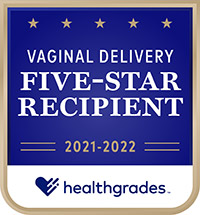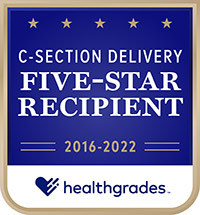Maternity at Somerset Campus
Because we know how special the birth of each baby is and how unique each family is, we want every birth at Robert Wood Johnson University Hospital Somerset to reflect the very personal needs and preferences of each family. With state-of-the-art technology and our exceptional art of caring, we look forward to sharing one of the most joyous experiences in a lifetime ... the birth of your baby.
The Mother-Baby Pavilion at Robert Wood Johnson University Hospital Somerset provides a wide range of services and programs for expectant and new moms as well as their babies, including:
-
Level II NICU staffed 24/7 by a board-certified neonatologist and specially trained nurses
-
24/7 anesthesiologist on site dedicated to obstetrics
-
24/7 OB/GYNs on-site (video)
-
Counseling with Maternal-Fetal Medicine staff and perinatologist
-
Lactation consultant for inpatient and outpatient visits to help with breastfeeding
-
A Comprehensive Diabetes Center that offers pregnancy and post-partum counseling
-
A Family Practice Center with physicians dedicated to obstetrics and family care
-
Convenient postpartum and infant care classes given on the maternity pavilion during your stay to get you ready for discharge
Maternity Pavilion Tours for expectant parents are available on Thursdays by appointment. Call 908-704-3766.
Personalized Care in Our Modern Maternity Pavilion
Our renovated Maternity Pavilion features every comfort and convenience to enhance your hospital stay.
The Labor and Delivery Unit is comprised of seven large private rooms for labor and birth, a Jacuzzi tub and two operating rooms and a recovery room for cesarean sections.
Our postpartum unit features 20 all-private, modern rooms with flat-screen TVs and sleep-in arrangements for your primary support person. Each room features the Get Well Network, an interactive patient education system.
To register for a childbirth education class or a tour of our facility, please call 908-704-3766.
We take pride in the personal attention and individuality that is the hallmark of the maternity experience at Robert Wood Johnson University Hospital Somerset. We never forget that we are privileged to be part of the wonder of birth. And we would be delighted to share the joy of the birth of your baby.
Our hospital’s trusted relationship with the Regional Perinatal Center at Robert Wood Johnson University Hospital in New Brunswick offers patients and their family’s access to advanced specialty care in areas like maternal-fetal medicine, high-risk pregnancies, neonatology, and more. The Regional Perinatal Center is also home to the state’s only academic pediatric health campus, which includes a diagnosis and research facility, an inpatient children’s hospital and an outpatient rehabilitation hospital just for kids.
Newborn Nursery
During his/her stay in our newborn nursery, your baby will have several screenings and tests performed.
- Jaundice check by using a non-invasive bilimeter
- Oxygen saturation check with a sensor
- Metabolic screening test
- Hearing screening on the evening before discharge
- The pediatrician may order the hepatitis B vaccine to be given before discharge.
Your nurse will explain all of these tests and any medications. There is additional information on infant care in your baby’s folder.
Level II Intermediate Nursery and Neonatology
Robert Wood Johnson University Hospital Somerset is home to a Level II Intermediate Care Nursery in addition to the well-baby nursery.
There is a neonatologist present 24/7 to provide specialized medical care for infants born at 32 weeks or more. The nursery uses the latest technologies and monitoring devices to care for your baby. If your baby requires advanced care the specialized team within our Level II Intermediate nursery will provide that care.
If your baby is in the Level II Nursery, two family visitors are allowed to visit at a time, accompanied by at least one parent of the baby.
Babies who need more intensive care are stabilized in our Level II Intermediate Care Nursery and then transferred with a special team to the Neonatal Intensive Care Unit at Bristol-Myers Squibb Children's Hospital at Robert Wood Johnson University Hospital.
Please know that we provide the highest-quality patient care. We focus on individualized care for you and your baby and our entire team goes above and beyond to work closely with you throughout your maternity experience.
We look forward to providing you and your family with excellent care and are always interested in your feedback.
State-of-the-Art Prenatal Technology
Robert Wood Johnson University Hospital Somerset has two technologies available to help ensure healthy pregnancies, 3D ultrasounds and on-site laboratory test to determine whether a pregnancy is high risk.
3D Ultrasound
This highly advanced form of obstetric imaging shows an unborn baby’s features so clearly that you could count every vertebrae of the baby’s spine. It also can project 4D action images of the baby in the womb. The ultrasound can detect abnormalities such as club feet, overlapping fingers, cleft palate, deformed fingers and toes, and spinal and facial defects.
For most women, only the traditional 2D ultrasound is needed. A 3D ultrasound would be recommended by a physician only if a 2D ultrasound indicated a serious problem with the baby. The test is only performed for medical reasons.
Conducted by sonographers specially trained in obstetric imaging, the one-hour test is offered in Robert Wood Johnson University Hospital Somerset’s perinatology suite.
Lab Test for Premature Births
A test performed at the medical center's clinical laboratory can determine if expectant mothers are at high risk for preterm delivery. The test is performed on women who are between 24 and 34 weeks pregnant and have shown signs of premature labor or are considered high risk for premature delivery.
The test checks for fetal fibronectin, a protein found in the uterus when the placenta begins to separate from the uterine wall. Its presence indicates that a woman is at high risk for giving birth within 7 days. If it is detected, a doctor may opt to hospitalize a woman to try to delay labor as long as possible through preventive measures such as labor-suppressing medications.
The test is available to inpatients and outpatients at the medical center 24 hours a day, 7days a week. Results of the test are available in approximately 2 hours.
Important Numbers to Know
Main Hospital
908-685-2200
Childbirth Education Classes
908-704-3766
Labor and Delivery Unit
908-685-2865
Mother-Baby Unit
908-685-2863
Nursery
908-685-2864
Find a Physician
1-888-724-7123
Learn more about what to expect before, during and after the birth of your baby at Robert Wood Johnson University Hospital Somerset.





